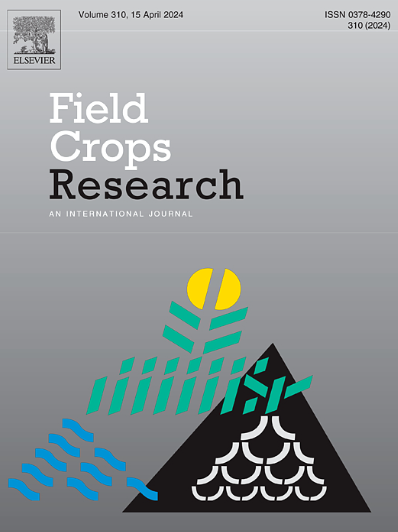Development of a model for maize stalk lodging resistance based on plant bending strength and trait selection
IF 5.6
1区 农林科学
Q1 AGRONOMY
引用次数: 0
Abstract
Context
Stalk lodging is a critical factor limiting maize (Zea mays L.) grain yield and quality worldwide. Despite identifying numerous traits associated with stalk lodging resistance, the relative importance of these traits remains unclear, hindering the breeding of resistant varieties. Recently, machine learning techniques have shown promise in agricultural research, particularly in plant disease identification and precise phenotyping. The advanced methods offer new approaches to analyze complex trait interactions and predict stalk lodging resistance.
Objective
The objective of this study is to develop a maize plant bending strength evaluation model based on machine learning algorithms. Through model simulation, this study aims to identify sensitive traits that can improve maize stalk lodging resistance, thereby providing theoretical support for maize stalk lodging-resistant breeding.
Methods
A three-year field experiment was conducted to construct phenomic datasets through a combination of variety selection, tailored planting densities, and treatments with plant growth regulators (PGRs), generating 288 datasets encompassing 30 phenotypic traits from maize populations with distinct structural characteristics. To quantify maize stalk lodging resistance, plant bending strength was measured, and these comprehensive phenotypic indicators were collected through field surveys and calculations. A machine learning model, based on the random forest algorithm, was developed to identify and define clear indicators of maize stalk lodging resistance, providing a robust framework for understanding this critical trait.
Results
Approximately 46.9 %, 23.2 %, and 10.3 % of the trait pairs showed absolute correlation coefficients greater than 0.5, 0.7, and 0.8, respectively, indicating substantial collinearity among indicators. Lasso regression was employed for feature selection, reducing 30 indicators to 16 key features. Based on these 16 indicators as input parameters and plant bending strength as the output parameter, a prediction model was constructed using the Random Forest algorithm. The model performed excellently, with a coefficient of determination of 0.94, a root mean square error of 0.82, and a relative root mean square error of 0.09. Sensitivity analysis of the model indicated that the crushing strength of the 7th internode in maize is the key factor affecting Plant bending strength, with an importance score of 0.743, significantly higher than other phenotypic traits.
Conclusion
This study developed a machine learning-based model for evaluating maize plant bending resistance, identifying the crushing strength of the 7th internode as a key trait for breeding stalk lodging-resistant varieties.
Significance
This study, utilizing machine learning models, pioneered the identification of key traits for maize stalk lodging resistance, providing new theoretical basis for breeding stalk lodging-resistant varieties and contributing to maintaining maize yield potential and grain quality.
求助全文
约1分钟内获得全文
求助全文
来源期刊

Field Crops Research
农林科学-农艺学
CiteScore
9.60
自引率
12.10%
发文量
307
审稿时长
46 days
期刊介绍:
Field Crops Research is an international journal publishing scientific articles on:
√ experimental and modelling research at field, farm and landscape levels
on temperate and tropical crops and cropping systems,
with a focus on crop ecology and physiology, agronomy, and plant genetics and breeding.
 求助内容:
求助内容: 应助结果提醒方式:
应助结果提醒方式:


